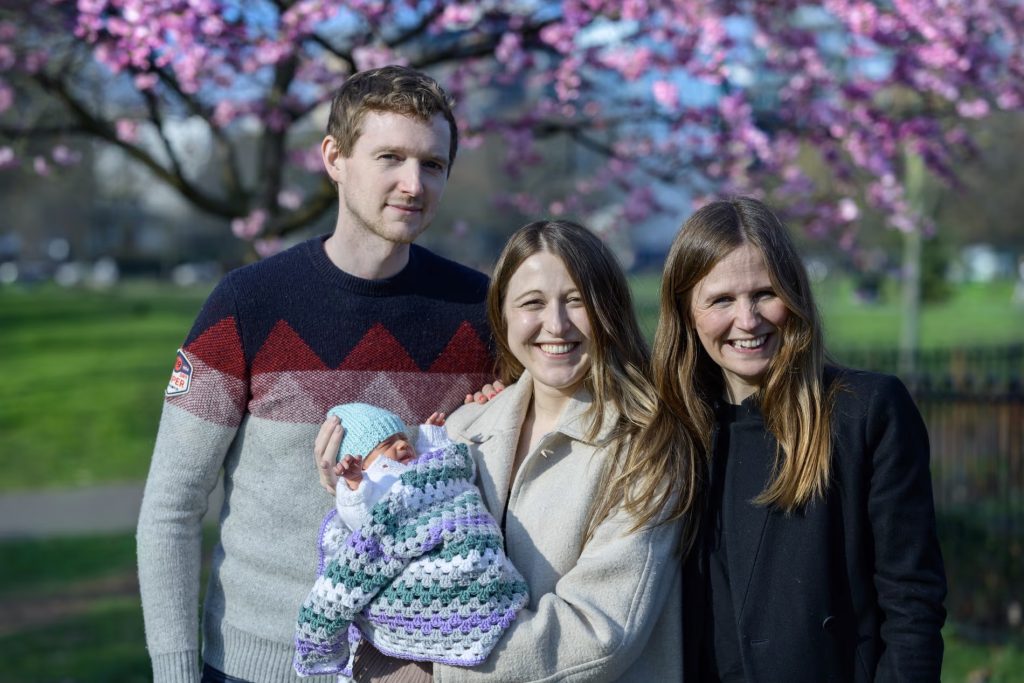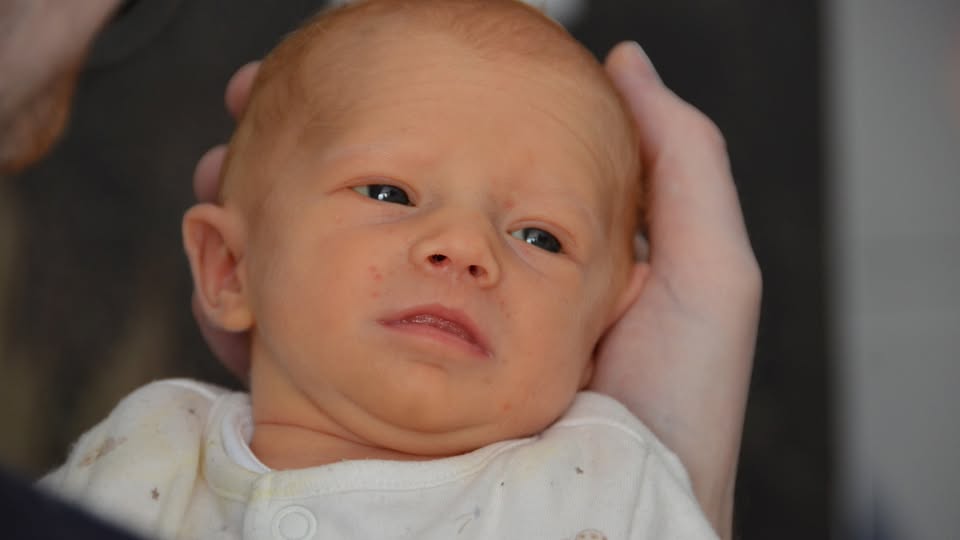In a historic moment for British medicine, the United Kingdom has welcomed its first baby born following a womb transplant — a milestone hailed as a symbol of hope and possibility for women who are unable to conceive naturally due to uterine factor infertility.
The baby girl, named Amy Isabel Davidson, was delivered by caesarean section on February 27, 2025, at Queen Charlotte’s and Chelsea Hospital in London. Her birth marks the successful culmination of years of pioneering research, complex surgery, and careful fertility treatment, positioning the UK among a handful of countries that have achieved live births through this highly specialized procedure.
A Sister’s Remarkable Gift
Grace Davidson, 36, an NHS dietitian from London, was born without a womb due to Mayer-Rokitansky-Küster-Hauser (MRKH) syndrome — a rare congenital condition that affects about one in every 5,000 female births. Though women with this condition typically have normal ovaries and external genitalia, they lack a functional uterus, making pregnancy impossible without intervention (The Guardian, 2025).
In 2023, Davidson’s older sister, Amy Purdie, 41, made an extraordinary decision: to donate her womb. The intricate transplant surgery, which took over eight hours, was performed at the Churchill Hospital in Oxford by a team from Imperial College Healthcare NHS Trust, led by Professor Richard Smith, a consultant gynaecological surgeon who has spent more than two decades advancing this field.
“I just wanted to help my sister experience what it’s like to carry a child,” Purdie explained in an interview. “I’d completed my own family and felt that this was something meaningful I could give her” (Sky News, 2025).

Grace and Angus Davidson with baby Amy Isabel, and the baby’s aunt and the donor of the womb, Amy Purdie. Photograph: Joe Daniel/PA
IVF, Transplant, and a New Life
Before the transplant, Grace and her husband, Angus Davidson, underwent fertility treatment to create embryos using Grace’s own eggs and Angus’s sperm. Because the transplanted uterus has no connection to the ovaries, natural conception is not possible. The embryos were frozen in preparation for in vitro fertilization (IVF) after Grace’s recovery from surgery.
Several months later, doctors implanted one of the embryos into the transplanted womb, and Grace became pregnant on the first attempt. Her pregnancy was closely monitored by specialists from Imperial College Healthcare and Queen Charlotte’s and Chelsea Hospital, given the complexities of her case and the medication required to prevent organ rejection.
On the day of her scheduled caesarean, Grace described feeling both overwhelmed and exhilarated. “It was just hard to believe she was real. I’d spent so long imagining what this moment might be like, and suddenly, there she was,” she said, holding baby Amy Isabel for the first time (The Guardian, 2025).
The Cost and Challenge of Womb Transplants
This groundbreaking achievement was made possible through Womb Transplant UK, a charity established to develop and fund uterine transplant procedures in Britain. Unlike countries such as Sweden and the United States, where some womb transplants are funded by healthcare systems or research institutions, the UK programme currently relies entirely on charitable donations.
Each transplant costs between £25,000 and £30,000, excluding IVF expenses, immunosuppressant drugs, and post-surgical care. NHS England has yet to formally approve public funding for womb transplants, citing concerns over costs and resource prioritization (The Conversation, 2025).
Despite this, Professor Smith and his team remain committed to expanding access to the procedure. “After 25 years of work, we finally have a baby — little Amy Isabel. It’s astonishing and deeply emotional for everyone involved,” Smith said after the birth (The Guardian, 2025).
A Global Perspective on Uterine Transplants
Womb transplants remain one of the most complex and ethically debated areas in reproductive medicine. Globally, more than 100 uterus transplants have been performed to date, resulting in over 50 live births. The first successful case occurred in Sweden in 2014 when a woman with MRKH syndrome gave birth after receiving a womb from a family friend (Associated Press via The Guardian, 2025).
In the UK, Grace Davidson’s case is the first of its kind. Since her surgery, several more transplants have been performed, including procedures using deceased donor wombs. Early results have been promising, and several women are currently undergoing assessment for future transplants.
Medical experts highlight the importance of careful patient selection, strict ethical guidelines, and the need for further research. Womb transplantation, unlike other life-saving organ transplants, is classified as life-enhancing, raising questions about prioritization within overstretched healthcare systems. Additionally, decisions about organ donation for wombs — especially from deceased donors — remain sensitive and legally complex (The Conversation, 2025).
Hope for Women Facing Uterine Factor Infertility
While the procedure is unlikely to become a mainstream NHS service in the immediate future due to its cost and complexity, this first UK birth signals hope for women affected by conditions like MRKH syndrome, uterine scarring, or cancer-related hysterectomies.
Dr. Edward Morris, president of the Royal College of Obstetricians and Gynaecologists, commented on the significance of this development: “Womb transplants provide an incredible new option for women born without a uterus or those who’ve lost theirs due to medical reasons. While not without challenges, this technology could transform lives” (Sky News, 2025).
For Grace Davidson and her family, the experience has been nothing short of life-changing. Speaking about her sister’s role in making the pregnancy possible, Grace said, “Amy’s gift was beyond anything I could have imagined. Every time I hold my daughter, I’m reminded of the love and sacrifice behind her being here” (The Guardian, 2025).
As little Amy Isabel grows, her birth represents not just a personal miracle for one family but also a significant leap forward in medical science — opening the door to new possibilities for many women once told that motherhood was impossible.
Sources:
-
The Guardian (2025). ‘It was just hard to believe she was real’: UK’s first baby born from womb transplant. Retrieved from The Guardian
-
The Conversation (2025). Baby girl becomes first child in UK to be born from womb transplant. Retrieved from The Conversation
-
Sky News (2025). UK first as baby born following womb transplant. Retrieved from Sky News
-
Associated Press via The Guardian (2025). First successful womb transplant birth in Sweden.






Leave a Reply